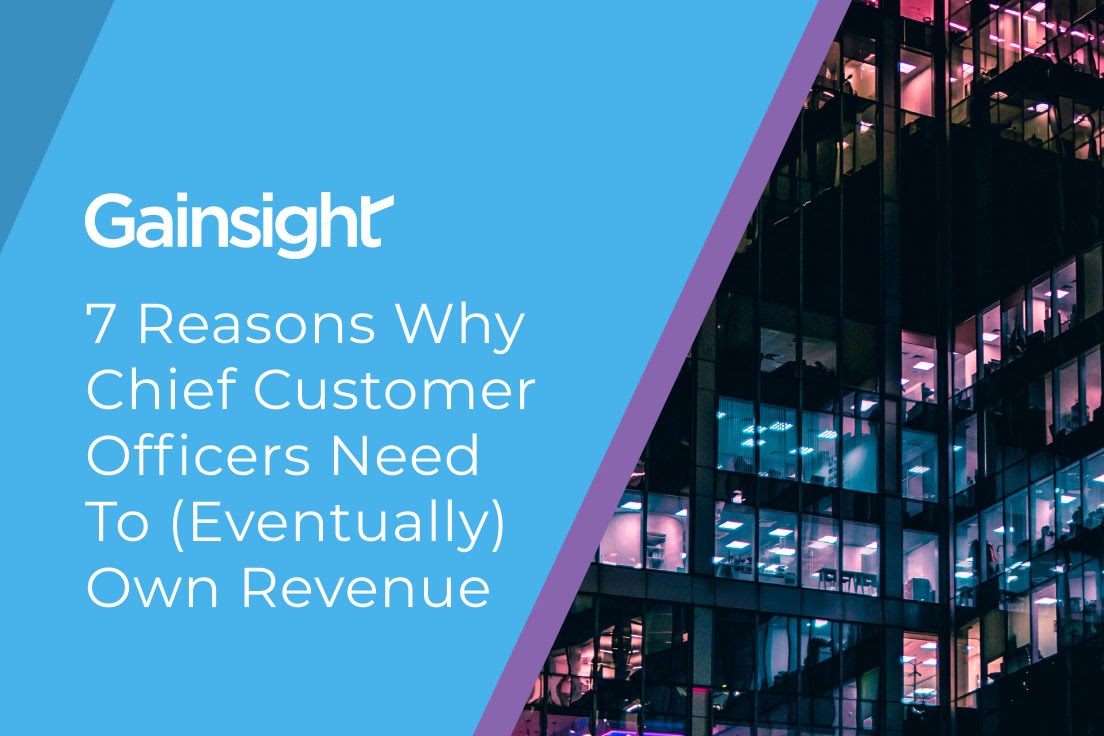7 Reasons Why Chief Customer Officers Need To (Eventually) Own Revenue


“Not everything that counts can be counted, and not everything that can be counted counts.”
– Albert Einstein
“I don’t care about that Einstein quote. What’s the ROI of Customer Success?”
– Your CFO
If you want to start a fight (or at least a spirited debate) at a Customer Success conference, yell the following question and run out of the room:
“Should CSMs own renewals?”
This seemingly innocent question touches a nerve around the core charter of Customer Success, with two different world views:
- “CSMs should own renewals because the point of Customer Success is to drive improved retention.”
- Or “CSMs should not own renewals because the job is to drive success for the customer, and if they own renewals, the client might not view them as a trusted advisor.”
There is a lot more to these points of view, but I’ve captured the core trade-offs the industry is wrestling with. Thankfully, this blog post is not about wading into that hornet’s nest of an argument!
Whether or not your CSMs own revenue, however, I want to make the argument that you, as a current or aspiring Chief Customer Officer, absolutely should. I’m addressing this post to the head of “post-sales” in your company. You likely have some combination of Customer Success Management, Support, Professional Services, Training, and perhaps other functions. Hopefully, you’re already holding the CCO title or on your way there.
Here are the seven reasons you should find a way to drive revenue.
1. Over Time, More And More CCOs Are Taking On Renewals
For companies with formal contract renewals, there are four standard organizational models:
Model #1: Same original Sales Rep handles new sales, up-sell/cross-sell, renewals, and partners with Customer Success Manager for adoption and value.
Model #2: Separate existing business Sales Rep (“Account Manager” or sometimes colorfully described as a “farmer”) owns renewals and up-sell/cross-sell and partners with CSM for adoption and value.
Model #3: Sales Rep or Account Manager handles up-sell/cross-sell, and CSM handles adoption, value, and renewals.
Model #4: Sales Rep or Account Manager handles up-sell/cross-sell, CSM handles adoption and value, and a dedicated Renewal Rep handles renewals.

Are you confused yet? It’s understandable because this stuff does get complicated. To simplify things,
Model #1 is becoming less common, except in large deal-oriented businesses. Model #2 is the most common in mainstream SaaS.
Models #2 through #4 create a mandate for CCOs to take on more. CCOs in Model #4 are increasingly finding themselves taking on the Renewal organization, in addition to the CSM team. This responsibility means that they own the renewal number, full stop. For mature companies, that’s a considerable number!
In Model #3, the CCO already has revenue responsibility since CSMs own renewals.
In Model #2, I have even seen some CCOs step up further and take over the Account Management organization, thereby owning all sales (renewal AND cross-sell/up-sell) to existing clients.
Even if the CCO doesn’t formally own the Renewal Rep or Account Management organization, they should think like they do and own “the number.” At least, that’s what I’m seeing from the best of the best out there.
2. The Customer Experience Will Likely Get Better
The current shared ownership model, where the CRO organization owns part of the renewal process, and the CCO organization owns another part, has pros and cons. On the one hand, the company can look to the CRO as “owning all revenue.” In this process, however, much of the existing client lifecycle sits with the CSM. That means the customer is stuck in a relatively-fragmented engagement model. And there is no C-level executive who sits over the entire process.
The more CCOs own revenue, the better things will get for clients.
3. Forecasting Will Get Better
And the better they will get for CFOs. Right now, renewal forecasting is complicated. Many companies “roll-up” two separate forecasts – one from a CSM team and one from an Account Management or Renewal Rep team. While having two views is sometimes very helpful (e.g., based upon health score versus judgment), lots of companies do not forecast in a coordinated matter. As such, executive teams aren’t getting the renewal predictability they’d like.
CCOs that own revenue become the single voice for revenue from existing customers.
4. Results Will Get Better
It’s not only about forecasting. Revenue-empowered CCOs improve results. CROs that have to balance new sales, cross-sell/up-sell, and renewals inevitably make trade-offs. Guess which type of revenue suffers? Yet, how a company handles renewals is a massive driver of long-term shareholder value. Operationally, renewals are rarely “home runs.” It’s more like the Michael Lewis book Moneyball. Renewals require constant attention to detail. What is the annual price increase? How should you handle concessions? What term should you optimize for?
Revenue-empowered CCOs make the optimal calls for the long-term lifetime value of a client.

5. Look Better To The Board
Generally speaking, software Boards understand one language — revenue. While they have to meet with almost all functions in a company, most Board Members will politely smile and nod at anything not tied to some kind of sale. The reality is that Boards lean in to listen when executives talk about initiatives that directly impact revenue and shareholder value.
The good news is that very few metrics drive share price growth more than Net Retention. Some CCOs, like our own Kellie Capote, are demonstrating how to make Board conversations less “squishy” by aligning CS efforts to revenue.
6. It’s Inevitable
There are few universal truths in business. But I’ll bet dollars to donuts on one proposition:
- “Big organizations with lots of costs and no revenue impact are hard to sustain.”
Inevitably, budgets get tight. Growth slows down. New investors come in. CEOs change.
If you are running a big post-sales organization, you are vulnerable in these situations. However, if you can tell the new Board Member or boss that “I drive $XM of revenue,” you are on much sturdier ground.
7. It’s Good For Your Career
I firmly believe that the CEOs of tomorrow will include many of the CCOs of today. It’s hard to get to the very top without driving revenue. Now is your chance.
You don’t have to do it all at once. Get clearer attribution of how your team impacts renewals and up-sell. Maybe take over renewals for small clients. Experiment with a new coverage model in your SMB customer base. Try something.
Go for it.
Owning a number is exciting. And it’s scary. It’s rewarding. And it’s maddening. But it’s the future. And it’s your future.
Do it!




